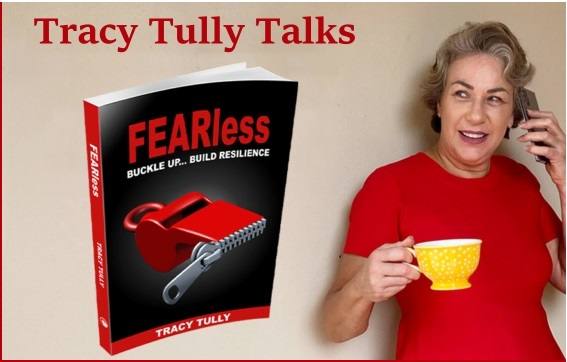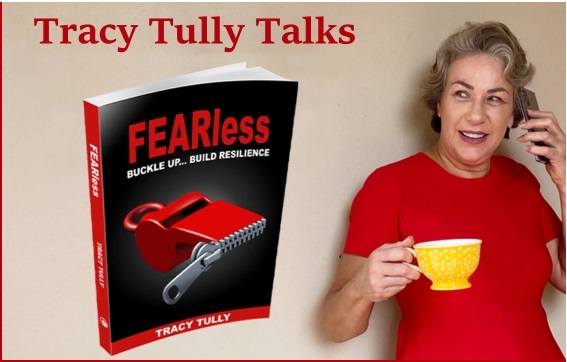Tracy Tully Talks, November 18, 2020
Tracy Tully Talks
Intro to Tracey and her bio - Tracey Horton is an International award-winning speaker, author, and qualified life coach. She has worked alongside men and women for over 25 years helping to rebuild lives and allowing people to become the best versions of themselves. She has spent years helping people to create their own authentic journey.
Tracey knows what real brokenness is and she has managed to build her life from that of an alcoholic, abused, poverty-stricken child to where she is today…a passionate, warm, caring and amazing woman. Her experiences have given her insight and wisdom that are today being used to help people create the life they could only dream of.
Through books, seminars, retreats and life coaching, Tracey has a way of equipping people to practically reach their goal and live their life to their fullest potential.\
Please welcome Tracey Horton.
RECAP What is Trauma?
Trauma is an emotional response to a terrible event like an accident, rape or natural disaster. Immediately after the event, shock and denial are typical. Longer term reactions include unpredictable emotions, flashbacks, strained relationships and even physical symptoms like headaches or nausea.
Why we talk about this – because all the research shows that not dealing leads to life long physical and mental health issues – the body keeps a score – health and longevity – you need to heal your trauma
Last week we spoke about triggers and why that’s important to recognize what they look and feel like and just to recap.
A trigger in psychology is a stimulus such as a smell, sound, or sight that triggers feelings of trauma. A trigger is a reminder of a past trauma. A flashback is a vivid, often negative memory that may appear without warning. It can cause someone to lose track of their surroundings and “relive” a traumatic event.
Triggers can take many forms. They may be a physical location or the anniversary of the traumatic event. A person could also be triggered by internal processes such as stress. Sometimes triggers are predictable. For instance, a veteran may have flashbacks while watching a violent movie. In other cases, triggers are less intuitive. A person who smelled incense during a sexual assault may have a panic attack when they smell the same incense in a store.
This week we are exploring the relationship between trauma and guilt, shame and blame. Im going to throw to you first and then circle back to the definitions and differences.
NOTES:
Guilt
Guilt is an emotional experience that occurs when a person believes or realizes—accurately or not—that they have compromised their own standards of conduct or have violated universal moral standards and bear significant responsibility for that violation.
Guilt is, first and foremost, an emotion.
-
Guilt Cause #1: Guilt for something you did, an action deserving of remorse,
-
Guilt Cause #2: Guilt for something you didn’t do, but want to. You deviate from your normal moral or ethical code, thoughts
-
Guilt Cause #3: Guilt for something you think you did. Before you start accusing yourself of wrongdoing, make sure that the wrongdoing actually took place
-
Guilt Cause #4: Guilt that you didn’t do enough to help someone.
-
Guilt Cause #5: Guilt that you’re doing better than someone else. survivor guilt - remind yourself how proud, glad and lucky you are
Guilt, in and of itself, isn't a destructive emotion. If you let it become all-consuming, however, guilt can get the best — or the worst — of you.
Cause you to reflect and make a change in behavior, thought pattern and mindset.
Blame
Blame is the act of censuring, holding responsible, making negative statements about an individual or group that their action or actions are socially or morally irresponsible, the opposite of praise. When someone is morally responsible for doing something wrong, their action is blameworthy.
With this background in mind, here are five reasons we play the blame game.
-
Blame is an excellent defense mechanism. Whether you call it projection, denial, or displacement, blame helps you preserve your sense of self-esteem by avoiding awareness of your own flaws or failings.
-
Blame is a tool we use when we’re in attack mode. Falling into the category of a destructive conflict resolution method, blame is a way to try to hurt our partners.
-
We’re not very good at figuring out the causes of other people's behavior, or even our own. The attributions we make, whether to luck or ability, can be distorted by our tendency to make illogical judgments. And we're just as bad at making judgments involving the blameworthiness of actions in terms of intent vs. outcome.
-
It’s easier to blame someone else than to accept responsibility. There’s less effort involved in recognizing your contributions to a bad situation than in accepting the fact that you're actually at fault, and changing so you don't do it again.
-
People lie. As my colleague, Robert Feldman, discovered, “Everybody lies.” It’s pretty easy just to lie and blame someone else even though you know you’re at fault. You may figure that no one will know it was really you who spilled coffee all over the break room, so you just blame someone else who’s not there (and hope that person never finds out).
Unlike other games, the more often you play the blame game, the more you lose. Learning to tell when you need to own up to your role in a bad situation will help you grow from your experiences, and ultimately help you achieve more fulfilling relationships.
Shame
-
Shame - Shame is a very, uniquely destructive emotion that anyone can face in their life. What makes shame such a segregated feeling is that it tends to exist overwhelmingly without any real purpose, unlike guilt. When someone has shame, they are hurting themselves internally, blaming themselves for the events that they had no control over.
-
Shame - it damages a person’s self-image in such a way that no other emotion can. When ignored, this debilitating emotion can destroy external relationships
-
Shame often stems from a Traumatic experience – people can often think they could have done something to prevent that trauma,
Brene Brown –
Shame is a focus on self, guilt is a focus on behavior. Shame is “I am bad.” Guilt is “I did something bad.” How many of you, if you did something that was hurtful to me, would be willing to say, “I’m sorry. I made a mistake?” How many of you would be willing to say that? Guilt: I’m sorry. I made a mistake. Shame: I’m sorry. I am a mistake.
I believe that guilt is adaptive and helpful – it’s holding something we’ve done or failed to do up against our values and feeling psychological discomfort.
I define shame as the intensely painful feeling or experience of believing that we are flawed and therefore unworthy of love and belonging – something we’ve experienced, done, or failed to do makes us unworthy of connection.
I don’t believe shame is helpful or productive. In fact, I think shame is much more likely to be the source of destructive, hurtful behavior than the solution or cure. I think the fear of disconnection can make us dangerous.
Shame = negative self-judgement and viewing yourself as worthless.
Guilt = You evaluate an action or behavior you did as unfavorable, but as a person, you still feel valued internally.
-
Working with shame, like working with trauma, must be done slowly and carefully.
Why should we aim to heal shame in our lives:
Here’s what the research says – leads to numerous relationship issues, honesty issues, abusive behavior, abusive relationships, alcoholism, workaholism, compulsive behaviors like shopping and gambling – if these aren’t enough to seek help then in the worst case scenarios it can lead to suicide. It leads to unworthiness, low self esteem.
Getting help:
-
Recognizing the signs of shame and understanding what triggers that feeling;
-
Becoming critically awareness of shame including those elements of cultural and interpersonal impacts
-
Reaching out to others to share your story
-
Giving voice to those feelings of shame, since shame derives its power from secrecy.
Things that help
-
Talking, writing journaling, counseling, CBT, NLP, etc
-
Develop shame resilience
Shame resilience – reconnects us
A shame screen is a defense mechanism we employ when we experience shame. Our brain involuntarily invokes our flight, flight, or freeze instinct. In social situations, it this means our first and most basic urge is one of the following: (a) Move away—withdraw, hide, stay silent, keep secrets; (b) Move against—try to gain power over the other, be aggressive, control; or (c) Move toward—seek to please, try to belong. Recognizing our basic fear instincts in social situation allows us to recognize that we are in shame and choose an alternate response.
Brown asserts that empathy and shame are on opposite ends of a continuum. Shame results in fear, blame (of self or others), and disconnection. Empathy is cultivated by courage, compassion, and connection, and is the most powerful antidote to shame.
Men and Women experience Shame differently.
Shame tells us that we are unworthy, unlovable, and incapable of change. Shame tells us that our imperfections make us inadequate and that our vulnerabilities are weaknesses.
Tracy Tully Talks

Tracy Tully Talks with Tracy Tully
- A motivation percolator, wordsmith and distiller of fear; Tracy turns chaos into calm, disorganization into structure and overwhelm into power and passion.
- She creates influential speakers all over the world, by helping people unlock their voice lifting their Profile, Prestige and Profit.
- She teaches confident conversations by overcoming fear through motivation and resilience, funding a lifestyle working anywhere in the world.
- Tracy challenges people to step out of their comfort zone, building their resilience muscle!
- She conducts powerful and witty speaking opportunities, growing confidence, improving motivation and strengthening resilience
A purveyor of inspiration, Jill-of-all trades in mastering fear, building courage and strengthening resilience; Tracy’s key message is:
"Life is like a box of chocolates; each sweet delicacy is a goal enticing you to keep moving forward. But in every box of chocolates, there will always be one or two you don’t like. I’ll show you how to find the sweet spot in everything, most of the battle is achieving the right mindset"









